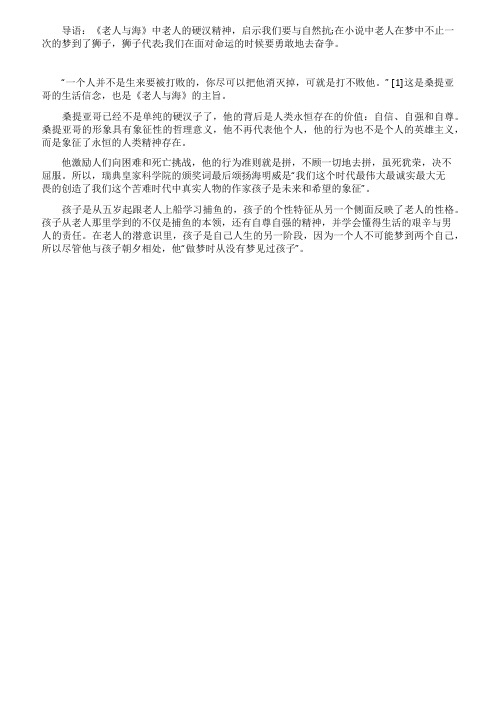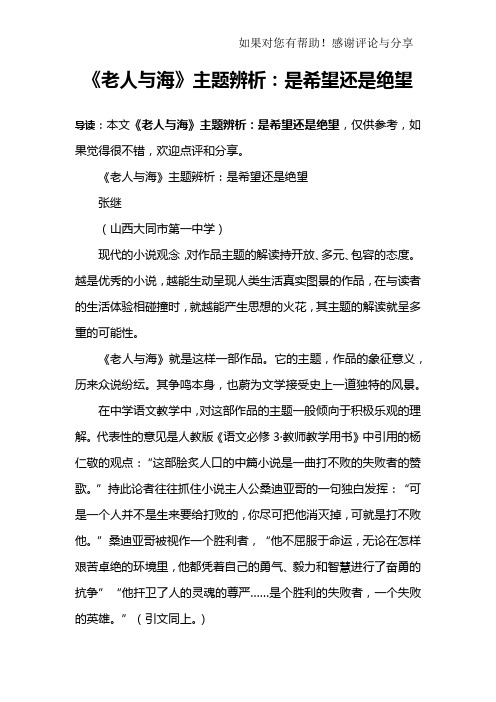从精神分析的角度浅析《老人与海》
- 格式:pdf
- 大小:224.74 KB
- 文档页数:12

老人与海:岁月与意志的英勇对抗简介《老人与海》是美国作家海明威于1952年创作的一部小说,被誉为他晚年杰作。
这部小说讲述了一个年迈的古巴渔夫坚持冒险捕捉巨大的马林鱼,并与其展开激烈斗争的故事。
它描绘了一个关于困境与希望、坚韧与意志的复杂主题,深受读者欢迎。
内容1. 老渔夫桑地亚哥的生活老渔夫桑地亚哥是一个乡村渔民,几十年来一直过着艰苦而孤独的生活。
文中通过描述他养成的工作习惯、内心世界以及他和社区人际关系等,呈现出一个勇敢坚毅而富有智慧的角色形象。
2. 渔夫遇到挑战:马林鱼的抓捕桑地亚哥渴望重新证明自己伟大的捕鱼技能,他踏上了一个艰难的挑战:马林鱼的抓捕。
他独自一人划着小船远离海岸,与这种庞大而强壮的鱼进行搏斗。
整个过程紧张、危险、充满了不确定性。
3. 意志力的抗争这次捕鱼旅程充满了曲折和挫折,但桑地亚哥并没有放弃。
他以顽强的意志继续战斗,无论是面对巨大波浪、渔具损坏还是体力逐渐消耗都没有退缩。
他通过始终坚信自己能够成功来助推自己前进。
4. 人与自然的关系在《老人与海》中,描绘了人与自然之间复杂而微妙的关系。
桑地亚哥在与马林鱼斗争时感受到了海洋的无情和庞大,但他也学会了尊重和敬畏自然,并且从中获得了力量和智慧。
5. 英勇在于坚持奋斗故事最后,桑地亚哥并没有成功带回马林鱼的躯体,但他所表现出来的坚持和勇气让人难以忘怀。
他证明了即使失败也要勇敢面对困境,保持乐观和积极的心态,努力追求自己的目标。
结论《老人与海》是一部描写坚持、意志力和挑战的经典作品。
通过桑地亚哥这个角色,作者向读者传递了关于生命的深刻思考。
无论岁月如何逝去,只要我们坚守信念、勇敢面对困境,并为自己的梦想和理想奋斗,就能在岁月与意志的英勇对抗中找到真正的力量和希望。

导语:《老人与海》中老人的硬汉精神,启示我们要与自然抗;在小说中老人在梦中不止一次的梦到了狮子,狮子代表;我们在面对命运的时候要勇敢地去奋争。
“一个人并不是生来要被打败的,你尽可以把他消灭掉,可就是打不败他。
” [1]这是桑提亚哥的生活信念,也是《老人与海》的主旨。
桑提亚哥已经不是单纯的硬汉子了,他的背后是人类永恒存在的价值:自信、自强和自尊。
桑提亚哥的形象具有象征性的哲理意义,他不再代表他个人,他的行为也不是个人的英雄主义,而是象征了永恒的人类精神存在。
他激励人们向困难和死亡挑战,他的行为准则就是拼,不顾一切地去拼,虽死犹荣,决不
屈服。
所以,瑞典皇家科学院的颁奖词最后颂扬海明威是“我们这个时代最伟大最诚实最大无
畏的创造了我们这个苦难时代中真实人物的作家孩子是未来和希望的象征”。
孩子是从五岁起跟老人上船学习捕鱼的,孩子的个性特征从另一个侧面反映了老人的性格。
孩子从老人那里学到的不仅是捕鱼的本领,还有自尊自强的精神,并学会懂得生活的艰辛与男
人的责任。
在老人的潜意识里,孩子是自己人生的另一阶段,因为一个人不可能梦到两个自己,所以尽管他与孩子朝夕相处,他“做梦时从没有梦见过孩子”。

《老人与海》主题辨析:是希望还是绝望导读:本文《老人与海》主题辨析:是希望还是绝望,仅供参考,如果觉得很不错,欢迎点评和分享。
《老人与海》主题辨析:是希望还是绝望张继(山西大同市第一中学)现代的小说观念,对作品主题的解读持开放、多元、包容的态度。
越是优秀的小说,越能生动呈现人类生活真实图景的作品,在与读者的生活体验相碰撞时,就越能产生思想的火花,其主题的解读就呈多重的可能性。
《老人与海》就是这样一部作品。
它的主题,作品的象征意义,历来众说纷纭。
其争鸣本身,也蔚为文学接受史上一道独特的风景。
在中学语文教学中,对这部作品的主题一般倾向于积极乐观的理解。
代表性的意见是人教版《语文必修3·教师教学用书》中引用的杨仁敬的观点:“这部脍炙人口的中篇小说是一曲打不败的失败者的赞歌。
”持此论者往往抓住小说主人公桑迪亚哥的一句独白发挥:“可是一个人并不是生来要给打败的,你尽可把他消灭掉,可就是打不败他。
”桑迪亚哥被视作一个胜利者,“他不屈服于命运,无论在怎样艰苦卓绝的环境里,他都凭着自己的勇气、毅力和智慧进行了奋勇的抗争”“他扞卫了人的灵魂的尊严……是个胜利的失败者,一个失败的英雄。
”(引文同上。
)然而这种“积极向上”的理解态度,并不是中外文学评论中的“主流观点”。
海明威自己就说:“作品是一场悲剧这个事实并不使我感到不快,因为我相信生活就是一场悲剧,而且它只能有一个结果。
”这究竟是一部“充满希望”的作品,还是表达了作者对生活的“绝望”的态度?我认为,从作品内容表现的几个主要方面来考查,并不难得出结论。
一、人与自然的关系《老人与海》描绘了一幅人与自然直接激烈对话的生动画面。
一个已进入迟暮之年的孤独的“硬汉”与大海、大马林鱼、鲨鱼群正面交锋。
这里,人与自然的关系既是依存的,又是对抗的,但我们看到的主要是对抗。
大海是老人赖以生存的家园,那里既是他衣食的来源,也是精神的归宿。
年轻时的桑迪亚哥在大海上搏击风浪,是个捕鱼高手,在大海上,他确证了自己的本质力量,证明了自己是个“英雄”。

老人与海的象征主题解读《老人与海》是美国作家厄内斯特·海明威的一部经典小说。
本书通过老渔夫桑提亚哥与他的奋斗故事,涵盖了许多象征意义丰富的主题。
以下是对《老人与海》中几个重要象征主题的解读。
1. 坚持和毅力在小说中,老渔夫桑提亚哥代表着坚持和毅力的象征。
尽管年事已高,他仍然坚定地追求自己的目标——捕捉一条巨大的马林鱼。
桑提亚哥通过不懈努力、聪明才智以及对海洋和生命深刻理解的运用,展现了顽强拼搏精神,成为一个令人钦佩的形象。
2. 虚荣与尊严虚荣和尊严是另一个重要的象征主题。
桑提亚哥曾经是一位著名渔夫,但近些年来连续遭受失败使他感到自尊心受到伤害。
捕获巨大鱼后失去它成为他的心结,而这次他决定不放弃,即使最终只能带回一只鱼骨头也要保持尊严。
3. 自然与命运自然是整个小说中最突出的象征。
海洋被描绘为强大的力量,代表了生命的循环和命运的无常。
桑提亚哥与海洋接触密切,通过对天气、鱼群等自然现象的观察和理解来预判和处理事物。
作者通过自然元素展示了人类与自然间微妙而复杂的关系。
4. 孤独与友谊孤独和友谊也是《老人与海》中常见的象征主题。
桑提亚哥在船上独自面对艰苦挑战,同时也有年轻男孩马诺林作为他唯一的朋友。
这种孤独但又不完全离羣的状态反映了人类内心深处对友情和联系的渴望。
5. 生死与重生生死与重生是小说中另一个显著的象征主题。
桑提亚哥奋斗艰难,最终在捕获巨大鲨鱼后被离弃的帆船拖向远海。
他在回程中逐渐感到力尽,这个过程象征着生命的消亡。
然而,最后他在回家的路上又与自然、与生命再度联结,这种重生象征了生命力与希望。
总之,《老人与海》通过许多象征主题深刻探索了人类的心灵和存在意义。
这些象征主题使得本书成为一部富有哲理和启示性的文学作品,对读者产生深远的影响。

老人与海的寓意与哲思《老人与海》的寓意与哲思《老人与海》是美国作家海明威的一部小说,讲述了一个老渔夫与一条巨大的马林鱼搏斗的故事。
这部小说以其深刻的寓意和哲思而著称。
本文将探讨《老人与海》中的寓意与哲思,并分析其对读者的启示。
一、人生的困境与坚持不懈在小说中,老渔夫圣地亚哥和他的小船一直在海上追逐一条巨大的马林鱼。
整整三天三夜,他与这条鱼进行了惊心动魄的搏斗。
尽管他疲惫不堪,但他从未放弃。
这展现了一个人在面临困境时的坚持不懈和无尽的勇气。
这种困境和坚持不懈的寓意体现了海明威对人生的看法。
在现实生活中,人们常常会遇到许多挑战和困境。
然而,只有坚持不懈、克服困难,才能获得成功。
《老人与海》通过老渔夫的决心和毅力,向读者传递了这一重要的哲思。
二、对失败的思考与接受尽管老渔夫最终战胜了马林鱼,但在将其捆绑在船上的途中,他却受到了一群鲨鱼的围攻,最终只剩下了马林鱼的骨架。
无法将这条巨大的鱼带回港口,老渔夫感到很失望。
然而,老渔夫并没有完全沮丧。
相反,他接受了失败,并从中汲取了经验教训。
他明白,成功并不仅仅取决于结果,而是在于努力奋斗的过程。
这种对失败的思考和接受,以及对人生智慧的追求,是《老人与海》中另一个重要的哲思。
三、人与自然的关系《老人与海》强调了人与自然的紧密关系。
老渔夫与大海之间建立了一种特殊的联系,他深深地感受到了大自然的力量和威严。
这种联系突显了人类与自然界之间的互动和依存。
海明威通过描写大海的壮丽和不可预测性,表达了对自然力量的敬畏和敬仰。
这使得读者反思人与自然之间的和谐:人类需要尊重和保护自然,而不是试图征服或摧毁它。
四、孤独与孤寂的存在在《老人与海》中,老渔夫面临着长时间的独自奋斗,孤独和孤寂成为他生活中不可忽视的一部分。
然而,尽管他孤独,他并不感到寂寞。
相反,他通过与自己的内心对话和与大自然的互动,找到了力量和勇气。
这揭示了一个重要的寓意:孤独并不一定是一种负面的体验。
它可以成为自我反思和成长的机会。

老人与海《老人与海》是美国文学家海明威的一部小说,讲述了一个叫做圣地亚哥的老渔夫,和一条巨大的马林鱼的斗争。
这个故事深刻表现了一个人对自然、对命运、对伙伴、对生命等众多因素的思考与追求。
老人与海的故事有着非常深刻的内涵,可以引导人们反思生命的真谛,坚韧不拔与追求的高尚情感。
老人与海的主人公圣地亚哥是一位年迈的海渔老人,他非常渴望捕到一条巨型马林鱼,但在他数十年的渔业生涯中,一直都没有实现这个愿望。
每逢渔季,老人都会和一个年轻小伙伴一同出海,可是每次都是空手而归。
这样的失败一次次积累,导致圣地亚哥走向了人生的谷底,但是他一直不放弃。
举一个例子来说,当他出海的第八十四天,终于捕到了自己心心念念的巨型马林鱼。
但是鱼非常强壮,拉了他数码丈的海。
老人感到自己的力气不足,而且要经历数小时的抵抗。
虽然身心俱疲,但是他拼尽全力,最终把鱼放到了小船上。
老人独自一人管理着这只鱼,要划行数百里返乡,这个过程中他又经历了很多的风浪和痛苦,但是他依然不放弃。
这样的故事也在告诉我们,每个人都需要有坚定不移的信念和对自己能力的信心。
举第二个例子,在《老人与海》的结尾处,圣地亚哥虽然最终失去了心心念念的巨型马林鱼,但是他返回小渔村的路途中,群鱼围绕着他的小船,并在船头跳跃,向他致敬。
尽管这个时候老人饥渴难耐、疲倦不堪,但他仍然感到非常的满足和幸福。
在这个过程中,他意识到他自身已经获得到了来自自然界的礼赞和尊重,这是比任何形式的成功和荣耀都更加的重要。
这个故事也在告诉人们:生命并非在于我们得到了多少,而在于我们为了追求而努力奋斗的过程。
“老人与海”这个故事向我们传递了多个值得推敲的哲理和深刻的人生道理。
首先,这个故事告诉我们,每个人起点并不相同,但是关键在于如何对待自己的生活和人生。
每一个人的生活中都会有无数的挫折以及艰难困苦,但是关键在于我们如何面对这些挑战,以及如何克服这些困难。
其次,这个故事还告诉我们,人生的意义并不是在于光鲜亮丽的成功,而在于我们为了追求而将尽全力、坚持不懈地拼搏的努力过程。
the old man and the sea赏析摘要:1.作品简介2.主题思想3.人物分析4.艺术特点5.总结全文正文:【作品简介】《老人与海》是20世纪美国作家海明威的代表作之一,讲述了一位古巴老渔民桑地亚哥与一条巨大的马林鱼展开殊死搏斗的故事。
这部小说不仅在世界文学史上具有重要地位,还使得海明威荣获了1954年度的诺贝尔文学奖。
【主题思想】《老人与海》的主题思想在于表现人类在面对自然挑战时,坚定的信念、勇敢的毅力和顽强的意志力。
通过描绘桑地亚哥与马林鱼的搏斗,以及他与鲨鱼的斗争,展示了人类顽强拼搏、永不放弃的精神。
这部作品传达了这样一个信念:无论面对多么强大的敌人,只要我们坚定信念、勇敢拼搏,就有可能战胜困难。
【人物分析】1.桑地亚哥:他是小说的主人公,一位年迈的渔民。
他勇敢、坚定、智慧,具有顽强的意志力。
尽管年事已高,但他仍然坚持捕鱼,渴望捕捉到一条大鱼。
在与马林鱼的搏斗中,他展现出了不屈不挠的精神。
2.马林鱼:它是桑地亚哥捕捉到的一条巨大鱼类,是小说中的核心形象。
马林鱼象征了自然的力量,体现了人与自然之间的较量。
虽然最终被鲨鱼吃掉,但它仍然具有崇高的悲剧色彩。
【艺术特点】1.简洁明了的文字:海明威的作品以简洁著称,他用简练的文字勾勒出丰富的画面,使读者沉浸在故事情节中。
2.象征手法:通过对马林鱼、鲨鱼等形象的刻画,表现了人与自然、勇敢与妥协等主题。
3.人物塑造:以桑地亚哥为代表,展示了古巴渔民勇敢、坚韧的性格特点。
【总结全文】《老人与海》是一部体现人类勇敢拼搏、不屈不挠精神的作品。
通过讲述桑地亚哥与马林鱼、鲨鱼的故事,展示了人类在面对自然挑战时所展现出的坚定信念、勇敢毅力和顽强意志。
解读老人与海的象征意义《老人与海》是美国文学泰斗海明威的代表作之一,小说以古巴渔民桑提亚哥为主人公,讲述了他孤身出海捕鱼,与大海斗争的故事。
小说通过桑提亚哥与大海的交互,深刻揭示了生命的意义、人与自然的关系等丰富的象征意义。
一、海洋的象征意义海洋是整个故事的主背景,它既是桑提亚哥的敌人,也是他的朋友。
小说中的海洋不仅仅是一个自然景色,更是象征着命运、时代、自然和生命等多重意义的存在。
首先,海洋象征命运。
小说中的海洋莫测、无常、不可控,桑提亚哥与之抗争,其实就是在抗争命运的摆布和安排。
桑提亚哥说自己有时候像一只在大海中漂浮的塑料瓶,任由海水推动他去哪里。
这启示了我们要勇敢地面对命运,毫不退缩,尽管命运充满不可测性,我们也要积极应对。
其次,海洋也承载了时代变迁的含义。
小说中提到,桑提亚哥年过六十,对于一个渔民而言已经是年迈之人。
他的事业是捕鱼,他执着于捕到越来越大的鱼,但他却发现现在海里的鱼越来越少。
这正是反映了时代的变迁,现代化的水产养殖、环境污染等都影响着海洋生态的平衡。
小说唤起我们对于环境的关注,同时也呼吁我们尊重自然,与自然和谐共处。
最后,海洋还可以视作是生命的象征。
生命和大海一样不可限量,人们可以在海洋中感受到无尽的宽广和深邃。
小说中桑提亚哥郑重地说过:“它是我认识的、见过的、遇到过的最大、最严格、最仁慈的父母。
”这里的“它”就是指代海洋,说明了海洋在人们心目中的尊崇地位。
我们的生命也如海洋一般广阔而深邃,无论何时都应该珍惜、舍弃不必要的浮躁,投身于内在的修养和成长。
二、老人的象征意义小说主人公桑提亚哥是一个已经几乎失去了生命力的老人,他把一生的精力都献给了大海。
他勇敢、坚忍、乐观的品格是海明威想要呈现的社会道德风貌。
首先,老人象征了人类面对时间、命运而坚韧不拔的精神。
桑提亚哥的身体非常虚弱,但是他却依然不放弃生活。
尽管桑提亚哥失去了母鱼和鲨鱼,但他并没有因此而绝望,仍然坚持追求自己的梦想。
《老人与海》艺术特色及人物现实意义《老人与海》艺术特色及人物现实意义导语:《老人与海》是海明威最优秀的小说之一,这部小说是海明威几十年观察社会、思考人生的结果。
老人的硬汉子形象具有浓厚的哲理性意义和象征意义,因而也使海明威在美国文学史上举足轻重,老人形象也正是海明威硬汉性格的真实写照。
下面是小编整理的《老人与海》的艺术特色,欢迎大家学习。
《老人与海》的艺术特色《老人与海》是美国当代著名作家海明威最重要的一部作品,正是这部作品使他获得了1954年度诺贝尔文学奖,从而莫定了他在世界文学史中的地位。
本文试着从作品的、象征手法、语言风格和意识流手法这三个方面来探究其艺术价值。
一、象征手法的运用《老人与海》是根据真人真事加工而成的小说,它既是一部现实主义力作,又是一部有多层寓意且寓意很深的作品。
作品丰富的象征寓意无疑是本书的一大亮点。
例如:《老人与海》,这一标题本身就使人展开丰富的联想:一个年迈、孤独的老人,驾一叶扁舟搏击于充满险风恶浪、茫茫无助的大海,这本身就是一种暗示、一种象征。
此时的桑提亚哥不只是一位普通的渔夫,他象征着整个为生存而斗争的人类,而大海者则象征着难以把握的变幻无穷的人生海洋。
人在自然面前,在危机四伏的社会中是那么的渺小、无助。
人类需要的正是海明威歌颂的桑提亚哥的硬汉精神,而它象征着一种人类精神,即人在精神上是不可摧毁的。
在困难面前坚毅不拔的毅力、冰不服输的勇气和信心,这是人类取得美好未来的保证。
大马林鱼的象征意义十分明显,它象征着人们所想要达到的人生目标。
老人追捕大马林鱼的过程,就是他追求自己梦想的过程。
对于一名作家而言,大马林鱼则离意着一部非凡的杰作,是作者不屈不挠、孜孜以求的人生目标。
小说中一个极其重要的象征物,是圣地亚哥魂系梦萦的“那群狮子”,它代表旺盛的生命力和青春,象征着老人对力量的追求和对强者的向往,每次梦见“那群狮子”后都给老人增添了无穷的精神力量。
群狮象征着同情弱者,仇视邪恶,既能创造人间奇迹,又能战胜各种邪恶势力的团结友爱的群体。
《老人与海》讲解《老人与海》是美国作家海明威的一部著名作品,于1951年首次出版。
本文将对《老人与海》的情节、主题和人物进行讲解,帮助读者更好地理解和欣赏这个经典之作。
一、情节讲解《老人与海》的故事发生在古巴的一个小渔村,主要讲述了年迈的渔夫圣地亚哥与一条无比巨大的马林鱼的搏斗。
圣地亚哥已经84天没有捕到任何鱼,被人称为“不走运的”渔夫。
终于,他渔获到了一条巨大的马林鱼,但是鱼太强大,将圣地亚哥的小船拖往大海深处。
圣地亚哥与鱼进行了一场激烈的较量,他用尽全身力气,始终不肯放弃。
最终,圣地亚哥战胜了鱼,但是在把鱼拖回渔村的路上,被鲨鱼咬去了一大半。
圣地亚哥疲惫不堪地回到了渔村,但他并没有气馁,他向所有人展示了他的战果。
他的坚韧精神深深打动了年轻的小伙伴马劳,使他对圣地亚哥充满敬意。
二、主题讲解《老人与海》有多重主题,其中最重要的主题是“人类与自然的搏斗”以及“尊严与希望的力量”。
在这个故事中,圣地亚哥与大海展开了一场激烈的搏斗。
作者通过形象生动的描写,展现了人与自然之间的对抗与互动。
圣地亚哥代表着人类的力量和意志,而马林鱼和鲨鱼则代表着不可预测的自然力量。
这是一场在生命边缘的搏斗,战胜了自然的力量,同时也战胜了内心的恐惧和痛苦。
另一个主题是“尊严与希望的力量”。
圣地亚哥坚守自己的信念,虽然他并不年轻,但他仍然希望能够捕到一条大鱼,证明自己的价值。
尽管他在这场搏斗中失去了鱼的身体,但他坚守自己的尊严,展示了人类内在的力量和意志。
三、人物讲解《老人与海》中的主要人物有圣地亚哥和马劳。
圣地亚哥是一个年迈而坚韧的渔夫,他已经84天没有捕到鱼了。
尽管遭遇了一系列的挫折,他依然不肯放弃,保持着乐观和坚定的心态。
圣地亚哥是一个刚毅勇敢的角色,他的形象象征着人类的固执和勇气。
马劳是一位年轻的小伙伴,他对圣地亚哥充满敬意。
虽然马劳只在本书的后半部分出场,但他对圣地亚哥的尊重和关心表达了对年长者和传统价值的重视。
四、结语通过对《老人与海》情节、主题和人物的讲解,我们可以更深入地理解这部作品所传达的思想和情感。
AnAnalysisofTheOldManandtheSeafromthePerspectiveofPsychoanalysis
1.IntroductionInSeptemberof1952TheOldManandtheSeawaspublishedbytheLifemagazine.Thenovellawhichsoldover5millioncopiesinaflash,broughtagreathonortoHemingway,whichincludedthePulitzerPrizeforFictionin1953andtheNobelPrizeinLiteraturein1954.Withoutashadowofdoubt,thenovellawasahugesuccessbothcriticallyandcommercially.Themajorityofconcurrentcriticismwaspositive.ThefamousnovelistWilliamFaulknersaidtheworktobeHemingway’sbest,venturingeventhatitwasperhapsthebestsinglepieceofanyofhiscontemporaries.“ThisnovelistheutmostachievementinwhichHemingwaysuccessfullyappliedhis‘IcebergPrinciple’tothepracticeandtheone-eighthoftheicebergofthenarrativerepresentstheseven-eighthsportionofthehidden.”(展春蕾,2008:7)Inthenovella,whatcanwefindoutabouttheseven-eightsportionofthestorythatispresumablytherebutisneitherspokennorvisible?HowdoesthespiritofacodeherolightuptheroadofSantiago?Furthermore,howcanweunderstandthethemeofthenovella,namely,“manisnotmadefordefeat,”and“amancanbedestroyedbutnotdefeated,”(ErnestHemingway,1952:103)byapplyingpsychoanalytictheorieswhicharealsocalledFreudtheories?AccordingtoFreud,thefounderofPsychoanalyticSchool,thepsychoanalyticstudyofhumanbehaviorsincludesresearchintowhathasbeenseen,theessenceandthehiddenmotivesofthesebehaviors.Psychoanalysisisthestudyofhumanbeings’unconsciouspsychicactivitieswhichare“thepartofaperson’smindwiththoughts,feelings,etc.thatheisnotawareofandcannotcontrolbutwhichcansometimesbeunderstoodbystudyinghisbehaviorordreams”(A.S.Hornby,2000:1653);itisamethodoftreatmentaswellasatheoreticalsystem.InFreud’sview,theunconsciousplaysanimportantroleinthepsychicactivitiesofthehumanbeings.Theobjectofpsychoanalyticstudyshouldincludethecontentoftheunconscious,aswellastheconsciouscontent.Freudbelievedthatliterarycreationwassimilartodreaming.Therearemanycommongroundsbetweenliteratureanddreams.Bothofthembelongtothefieldoftheunconsciousandshowustherepresseddesireswhicharetheemotionsordesiresthatoneisnotallowedtoorhardtoexpress.Andthesedesiresarealwaysshowedinnewformslikeliterarycreationordreams.Mostofthetime,theliteraryworksanddreamsdistortthosepent-updesiresnicely,andshowthemthroughthesameprocesseswhicharecondensation,displacement,symbolizationandrevision.Manyscholarshaveconductedstudiesonapplyingpsychoanalytictheoriestoliterarycriticisms;itistheirgreateffortthathasgivendifferentandnewperspectivestothevariousliteraryworks.TheOldManandtheSeahasalsoreceivedmanyliterarycriticismsallovertheworld.Thisthesiswilltrytoapplythethreerelatedtheoreticalelements,i.e.,thetopographicaltheories,thefemininepsychologyandthereligiouselementstomakeabriefanalysisofTheOldManandtheSea.Itishopedthatthispsychoanalyticreadingcanaddanewlayerofcharmtotheliteraryvaluesofthisworld–famousclassic.2.ATopographicalReadingofTheOldManandtheSeaTopographicalreadinghasbeenusedsincetheearlydevelopmentofpsychoanalysis,andhasdevelopedintoarichinterpretivesystem.Itprovidesaswellasenlargesthedirectionforpeopleinreadingtheliteraryworks.2.1AninterpretationofSantiago’sdreamsandbehaviorsFreuddividedthepsycheofhumanbeingsintothreedifferentparts,andhetooktheicebergforanexample.Inhisreasoning,thepsycheofhumanbeingsisjustlikeanicebergwhichfloatsinthesea.Thepartonthesurfaceisthevariouspsychicactivitiesthatwecanseeandfeel.Anditbelongstothefieldoftheconscious.Theprimaryparthiddenunderthewaterisinvisibleandthatiswhatwecannotbeawareof,sowecallthispartthefieldoftheunconscious;betweenthemisthefieldofthepreconscious.Andhethencalledthisseparationofhumanbeings’psycheasPsychicalTopographywhichisfurtherdevelopedandsummedupbyhissuccessorsintoTopographicalTheory.TopographicalTheorySystemhasborrowedtheword“Topographical”fromthegeologicaltermstodescribethepsychicactivitiesofhumanbeingswhichconsistoftheconscious,thepre-consciousandtheunconscious,ascanbeshowninthefollowingchart:
AfterwereadTheOldManandtheSea,weknowthatSantiago’sdreamsplayanimportantroleinthisnovella.Aswehavetalkedintheintroduction,theunconsciouscansometimesbeunderstoodbystudyingpeople’sdreamsorbehaviors.ThedescriptionsofthepsychologicaldreamsandphysicalbehaviorsareanimportantforceinpromotingthecharacterizationofSantiago,andthusexpresshispersonaldesire—topossesstheundefeatedsuperpower.2.1.1Santiago’unconsciousdesiresfromthedreamsWeoftendreambothinoursleeptimeanddaylife.Whatcanwefindoutfromadream?Howtointerpretit?Andwhydopeopledreamit?Theseareveryimportantquestionsthathumanbeingsdesiretoresolve.“Dreamsareasuccessionofimages,thoughts,oremotionspassingthroughthemindduringsleep.”(http://en.wikipedia.org/wiki/Dream)Freudvieweddreamingasakindofindispensableactivityinourmind.Evenwhenwearesleeping,wekeepworkingbothphysicallyandmentally.Thedreamscankeepapsychologicalbalanceinourlives.Ifweareforbiddentodream,wewillfallill.Andthedreamitselfistherepresentationofthepent-upcontent.ToFreud,onlytheunconsciousisthetruepsychicalreality,whichisahiddenandunknownworlddifferentfromthetransparentworld,and“dreamsaretheRoyalRoadtotheUnconscious”(qtd.展春蕾,2008:14)for“thedreamistheembodimentoftheinstinctivedesire.”(Freud,2004,12)InFreud’sopinion,dreaminterpretationistofindthelatentcontentfromthemanifestdream.HisworkTheInterpretationofDreamswhichintroducesalotofmethodsofdreaminterpretationwithmany